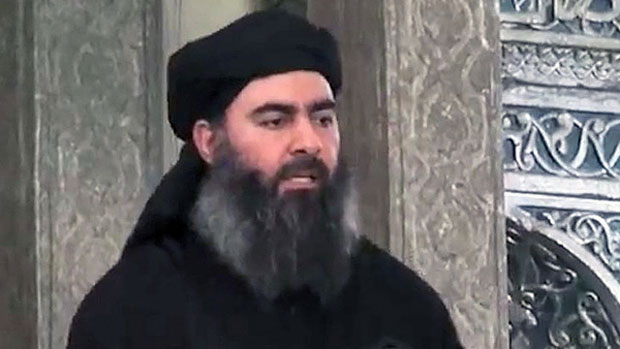Abu Bakr al-Baghdadi: Islamic State leader 'seriously wounded'
Head of the terror group 'no longer in control of day-to-day operations' after being injured in air strike

A free daily email with the biggest news stories of the day – and the best features from TheWeek.com
You are now subscribed
Your newsletter sign-up was successful
The leader of Islamic State is no longer in control of the group's operations after being seriously injured in an air strike in Iraq, several sources have told The Guardian.
Abu Bakr al-Baghdadi, considered to be one of the most powerful jihadi leaders in the world, was wounded during a coalition attack near the Syrian border in March, a Western diplomat and an Iraqi official have confirmed.
"The source said Baghdadi's wounds were at first life-threatening, but he has since made a slow recovery," the newspaper reports. "He has not, however, resumed day-to-day control of the organisation."
The Week
Escape your echo chamber. Get the facts behind the news, plus analysis from multiple perspectives.

Sign up for The Week's Free Newsletters
From our morning news briefing to a weekly Good News Newsletter, get the best of The Week delivered directly to your inbox.
From our morning news briefing to a weekly Good News Newsletter, get the best of The Week delivered directly to your inbox.
Since the attack, strategic decisions have been made by other members of the terror group. The group's military and the Shura councils are said to be in control while al-Baghdadi recovers.
Al- Baghdadi, also known as Abu Dua, is believed to be in his early 40s, according to the BBC. A secretive figure, he often dresses in disguise, earning him the nickname "the invisible sheikh". In 2011, the US offered a $10m reward for information leading to his capture or death.
The attack in which he was injured targeted local IS leaders and killed three other men, but Western officials are said to have been unaware that al-Baghdadi was part of the convoy.
"In recent months, air strikes have been increasingly effective in targeting the Isis leadership," says the Guardian. One of Baghdadi's closest aides, his deputy and the head of the group's military operations in Iraq were all killed in December.
A free daily email with the biggest news stories of the day – and the best features from TheWeek.com
-
 James Van Der Beek obituary: fresh-faced Dawson’s Creek star
James Van Der Beek obituary: fresh-faced Dawson’s Creek starIn The Spotlight Van Der Beek fronted one of the most successful teen dramas of the 90s – but his Dawson fame proved a double-edged sword
-
 Is Andrew’s arrest the end for the monarchy?
Is Andrew’s arrest the end for the monarchy?Today's Big Question The King has distanced the Royal Family from his disgraced brother but a ‘fit of revolutionary disgust’ could still wipe them out
-
 Quiz of The Week: 14 – 20 February
Quiz of The Week: 14 – 20 FebruaryQuiz Have you been paying attention to The Week’s news?
-
 Epstein files topple law CEO, roil UK government
Epstein files topple law CEO, roil UK governmentSpeed Read Peter Mandelson, Britain’s former ambassador to the US, is caught up in the scandal
-
 Iran and US prepare to meet after skirmishes
Iran and US prepare to meet after skirmishesSpeed Read The incident comes amid heightened tensions in the Middle East
-
 Israel retrieves final hostage’s body from Gaza
Israel retrieves final hostage’s body from GazaSpeed Read The 24-year-old police officer was killed during the initial Hamas attack
-
 China’s Xi targets top general in growing purge
China’s Xi targets top general in growing purgeSpeed Read Zhang Youxia is being investigated over ‘grave violations’ of the law
-
 Panama and Canada are negotiating over a crucial copper mine
Panama and Canada are negotiating over a crucial copper mineIn the Spotlight Panama is set to make a final decision on the mine this summer
-
 Why Greenland’s natural resources are nearly impossible to mine
Why Greenland’s natural resources are nearly impossible to mineThe Explainer The country’s natural landscape makes the task extremely difficult
-
 Iran cuts internet as protests escalate
Iran cuts internet as protests escalateSpeed Reada Government buildings across the country have been set on fire
-
 US nabs ‘shadow’ tanker claimed by Russia
US nabs ‘shadow’ tanker claimed by RussiaSpeed Read The ship was one of two vessels seized by the US military